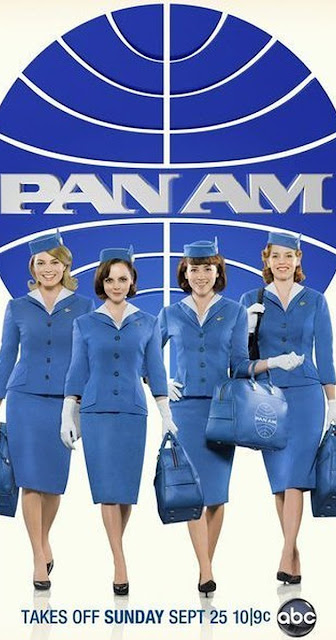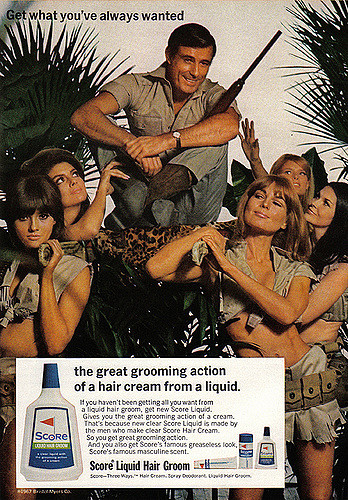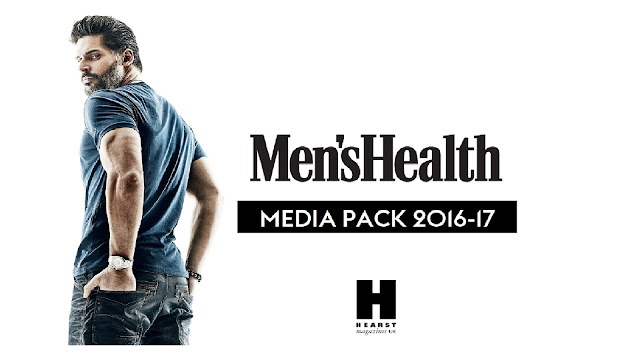MIGRAIN: Feminist theory
Read Playing With The Past: Post-feminism and the Media (MM40, page 64 )
1) What are the two texts the article focuses on?
2) What examples are provided from the two texts of the 'male gaze' (Mulvey)?
Pan Am
Pan Am provides many examples of the male gaze. The first example is shown at the beginning of the pilot episode- Laura (one of the stewardesses) is on the front cover of a magazine. This image is highly constructed and mediated, therefore is visually enjoyed by men.
The stewardesses of Pan Am frequently use their looks and bodies to get what they want, giving another opportunity for the male gaze.
The final sequence in the pilot episode provides the most obvious example. The four stewardesses are seen walking down the airport in slow motion (very similar to the picture on the left), their legs on show and their makeup and hair glammed up while men stop to stare in awe and women look in admiration.
Why don't you love me?
It can be argued that Beyoncé’s music video provides the male gaze throughout the duration of the whole video. Beyoncé can be seen wearing very revealing and sexualised clothing, giving men the opportunity to admire her.
Throughout the video she plays at being a ‘housewife’, humorously burning dinner, parodying mopping floors and dusting, all the while playfully gazing at the camera providing the audience with knowing winks. This self-conscious address allows Beyoncé to be objectified, welcoming the male gaze but simultaneously also avoiding feminist criticism through this use of parody and humour.
3) Do texts such as these show there is no longer a need for feminism or are they simply sexism in a different form?
I believe that texts such as the two above show that there is still a need for feminism. These texts are objectifying women but managing to avoid criticism with the notion that what they are doing is a way of showing women's empowerment.
4) Choose three words/phrases from the glossary of the article and write their definitions on your blog.
Post-feminism - The belief in society that there is no longer a need for feminism.
Patriarchy - The belief that men are more dominant and powerful than women.
Male gaze - A term created by media theorist Laura Mulvey; where women are objectified in the media for the pleasures' of men.
Music video analysis
Watch the Beyonce video for ‘Why Don’t You Love Me?’:
1) What are the two texts the article focuses on?
- HBO's period drama ‘Pan Am’(2011)
- Beyoncé’s music video ‘Why Don’t You Love Me’
2) What examples are provided from the two texts of the 'male gaze' (Mulvey)?
Pan Am
Pan Am provides many examples of the male gaze. The first example is shown at the beginning of the pilot episode- Laura (one of the stewardesses) is on the front cover of a magazine. This image is highly constructed and mediated, therefore is visually enjoyed by men.
The stewardesses of Pan Am frequently use their looks and bodies to get what they want, giving another opportunity for the male gaze.
The final sequence in the pilot episode provides the most obvious example. The four stewardesses are seen walking down the airport in slow motion (very similar to the picture on the left), their legs on show and their makeup and hair glammed up while men stop to stare in awe and women look in admiration.
Why don't you love me?
It can be argued that Beyoncé’s music video provides the male gaze throughout the duration of the whole video. Beyoncé can be seen wearing very revealing and sexualised clothing, giving men the opportunity to admire her.
Throughout the video she plays at being a ‘housewife’, humorously burning dinner, parodying mopping floors and dusting, all the while playfully gazing at the camera providing the audience with knowing winks. This self-conscious address allows Beyoncé to be objectified, welcoming the male gaze but simultaneously also avoiding feminist criticism through this use of parody and humour.
3) Do texts such as these show there is no longer a need for feminism or are they simply sexism in a different form?
I believe that texts such as the two above show that there is still a need for feminism. These texts are objectifying women but managing to avoid criticism with the notion that what they are doing is a way of showing women's empowerment.
4) Choose three words/phrases from the glossary of the article and write their definitions on your blog.
Post-feminism - The belief in society that there is no longer a need for feminism.
Patriarchy - The belief that men are more dominant and powerful than women.
Male gaze - A term created by media theorist Laura Mulvey; where women are objectified in the media for the pleasures' of men.
Music video analysis
Watch the Beyonce video for ‘Why Don’t You Love Me?’:
1) How might this video contribute to Butler’s idea that gender roles are a ‘performance’?
Beyoncé can be seen acting as a 'housewife' throughout the music video. She cooks, she mops floors, she dusts all while wearing revealing outfits. This contributes to Butler's idea of gender roles being a performance as she is performing all these chores in a parody and mocking way.
2) Does this video reinforce or challenge the view that women should perform certain roles in society?
As discussed in the question above, Beyoncé performs chores throughout the whole music video which reinforces the idea that women should perform these certain roles in society. The fact that she is signing 'why don't you love me?' while performing these chores further reinforces stereotypes as she is suggesting that the man should love her because of her capability to do all the things a good woman/wife is expected to do.
3) Would McRobbie view Beyonce as an empowering role model for women? Why?
McRobbie would view Beyoncé as an empowering role model for women because of the confidence she portrays in the music video. Furthermore, the lyrics of the song "I got beauty, I got class, I got style and I got ass....I even put money in the bank account. Don’t have to ask no one to help me out." would lead McRobbie to suggest that Beyoncé is showing women that they don't need a man to live their life.
4) What are your OWN views on this debate – does Beyonce empower women or reinforce the traditional ‘male gaze’ (Mulvey)?
Although I agree to a small extent that Beyoncé's music video empowers women (as discussed in question 3), I believe that it reinforces traditional stereotypes about women more than it empowers them. Firstly, the use of revealing clothing provides the opportunity for men to admire her (the male gaze). Furthermore, while Beyoncé is stating that she has everything that a man could want, therefore empowering herself, she can be seen crying in the video. She crys while drinking a cocktail and singing 'why don't you love me?' which highlights her desperation and want for a man. It is as if she has lost control because her man does not love her back, proving the statement that 'women need a man'.




Comments
Post a Comment